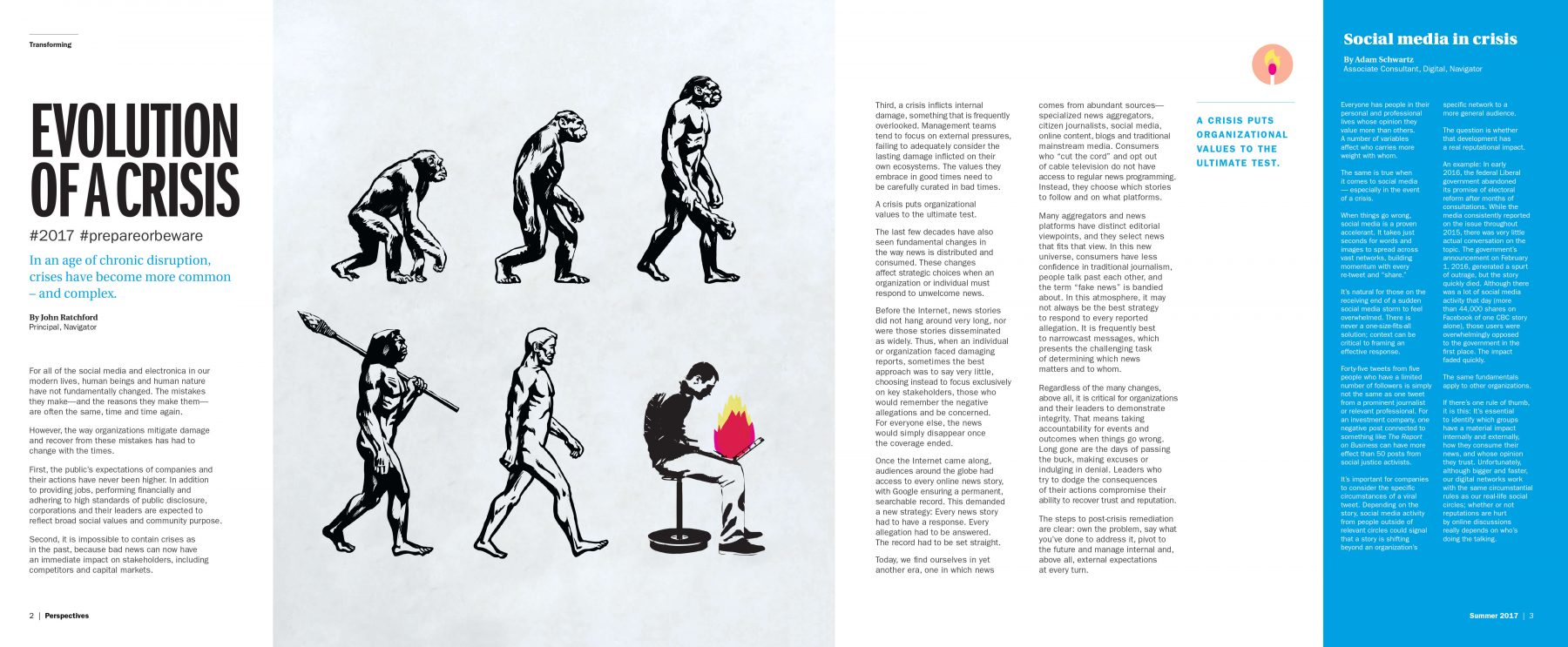- CEOCap
- Jaime Watt’s Debut Bestseller ‘What I Wish I Said’
- Media Training
- The Push Back
- Internship program
- Update Your Profile
- Homepage
- It’s time for a change
- It’s time for a change
- Kio
- Ottawa
- Art at Navigator
- Navigator Limited Ontario Accessibility Policy
- Virtual Retreat 2020 Closing Remarks
- COVID-19 Resources
- Offices
- Navigator Sight: COVID-19 Monitor
- Navigator Sight: COVID-19 Monitor – Archive
- Privacy Policy
- Research Privacy Policy
- Canadian Centre for the Purpose of the Corporation
- Chairman’s desk
- ELXN44
- Media
- Perspectives
- Podcasts
- Subscribe
- Crisis
- Reputation
- Government relations
- Public affairs campaigns
- Capital markets
- Discover
- studio
- How we win
- What we believe
- Who we are
- Careers
- Newsroom
- AI
- Empower by Navigator
- Environmental responsibility

In an age of chronic disruption, crises have become more common – and complex.
For all of the social media and electronica in our modern lives, human beings and human nature have not fundamentally changed. The mistakes they make—and the reasons they make them—are often the same, time and time again.
However, the way organizations mitigate damage and recover from these mistakes has had to change with the times.
First, the public’s expectations of companies and their actions have never been higher. In addition to providing jobs, performing financially and adhering to high standards of public disclosure, corporations and their leaders are expected to reflect broad social values and community purpose.
Second, it is impossible to contain crises as in the past, because bad news can now have an immediate impact on stakeholders, including competitors and capital markets.
Third, a crisis inflicts internal damage, something that is frequently overlooked. Management teams tend to focus on external pressures, failing to adequately consider the lasting damage inflicted on their own ecosystems. The values they embrace in good times need to be carefully curated in bad times.
A crisis puts organizational values to the ultimate test.
The last few decades have also seen fundamental changes in the way news is distributed and consumed. These changes affect strategic choices when an organization or individual must respond to unwelcome news.
Before the Internet, news stories did not hang around very long, nor were those stories disseminated as widely. Thus, when an individual or organization faced damaging reports, sometimes the best approach was to say very little, choosing instead to focus exclusively on key stakeholders, those who would remember the negative allegations and be concerned. For everyone else, the news would simply disappear once the coverage ended.
Once the Internet came along, audiences around the globe had access to every online news story, with Google ensuring a permanent, searchable record. This demanded a new strategy: Every news story had to have a response. Every allegation had to be answered. The record had to be set straight.
Today, we find ourselves in yet another era, one in which news comes from abundant sources—specialized news aggregators, citizen journalists, social media, online content, blogs and traditional mainstream media. Consumers who “cut the cord” and opt out of cable television do not have access to regular news programming. Instead, they choose which stories to follow and on what platforms.
Many aggregators and news platforms have distinct editorial viewpoints, and they select news that fits that view. In this new universe, consumers have less confidence in traditional journalism, people talk past each other, and the term “fake news” is bandied about. In this atmosphere, it may not always be the best strategy to respond to every reported allegation. It is frequently best to narrowcast messages, which presents the challenging task of determining which news matters and to whom.
Regardless of the many changes, above all, it is critical for organizations and their leaders to demonstrate integrity. That means taking accountability for events and outcomes when things go wrong. Long gone are the days of passing the buck, making excuses or indulging in denial. Leaders who try to dodge the consequences of their actions compromise their ability to recover trust and reputation.
The steps to post-crisis remediation are clear: own the problem, say what you’ve done to address it, pivot to the future and manage internal and, above all, external expectations at every turn.


